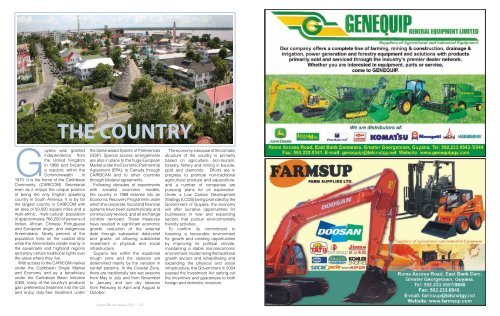Download PDF - The Georgetown Chamber of Commerce & Industry
Download PDF - The Georgetown Chamber of Commerce & Industry
Download PDF - The Georgetown Chamber of Commerce & Industry
Create successful ePaper yourself
Turn your PDF publications into a flip-book with our unique Google optimized e-Paper software.
Guyana was granted<br />
independence from<br />
the United Kingdom<br />
in 1966 and became<br />
a republic within the<br />
Commonwealth in<br />
1970. It is the home <strong>of</strong> the Caribbean<br />
Community (CARICOM) Secretariat<br />
even as it enjoys the unique position<br />
<strong>of</strong> being the only English speaking<br />
country in South America. It is by far<br />
the largest country in CARICOM with<br />
an area <strong>of</strong> 83,000 square miles and a<br />
multi-ethnic, multi-cultural population<br />
<strong>of</strong> approximately 766,200 <strong>of</strong> persons <strong>of</strong><br />
Indian, African, Chinese, Portuguese<br />
and European origin, and indigenous<br />
Amerindians. Ninety percent <strong>of</strong> the<br />
population lives on the coastal strip<br />
while the Amerindians reside mainly in<br />
the savannahs and highland regions<br />
and enjoy certain traditional rights over<br />
the areas where they live.<br />
With access to the CARICOM market<br />
under the Caribbean Single Market<br />
and Economy and as a beneficiary<br />
under the Caribbean Basin Initiative<br />
(CBI), many <strong>of</strong> the country’s products<br />
gain preferential treatment into the US<br />
and enjoy duty-free treatment under<br />
THE COUNTRY<br />
the Generalised System <strong>of</strong> Preferences<br />
(GSP). Special access arrangements<br />
are also in place to the huge European<br />
Market under the Economic Partnership<br />
Agreement (EPA), to Canada through<br />
CARIBCAN and to other countries<br />
through bilateral agreements.<br />
Following decades <strong>of</strong> experiments<br />
with socialist economic models,<br />
the country in 1989 entered into an<br />
Economic Recovery Programme under<br />
which the corporate, fiscal and financial<br />
systems have been systematically and<br />
continuously revised, and all exchange<br />
controls removed. <strong>The</strong>se measures<br />
have resulted in significant economic<br />
growth, reduction <strong>of</strong> the external<br />
debt through substantial debt-relief<br />
and grants, all allowing substantial<br />
investment in physical and social<br />
infrastructure.<br />
Guyana lies within the equatorial<br />
trough zone and the seasons are<br />
determined mainly by the variation in<br />
rainfall patterns. In the Coastal Zone,<br />
there are traditionally two wet seasons<br />
from May to July and from November<br />
to January and two dry seasons<br />
from February to April and August to<br />
October.<br />
Guyana Business 2010 | 30<br />
<strong>The</strong> economy, because <strong>of</strong> the climatic<br />
structure <strong>of</strong> the country is primarily<br />
based on agriculture, eco-tourism,<br />
forestry, fishery and mining in bauxite,<br />
gold and diamonds. Efforts are in<br />
progress to promote non-traditional<br />
agricultural produce and aquaculture,<br />
and a number <strong>of</strong> companies are<br />
pursuing plans for oil exploration.<br />
Under a Low Carbon Development<br />
Strategy (LCDS) being promoted by the<br />
Government <strong>of</strong> Guyana, the economy<br />
will <strong>of</strong>fer lucrative opportunities for<br />
businesses in new and expanding<br />
sectors that pursue environmentally<br />
friendly activities.<br />
To confirm its commitment to<br />
fostering a favourable environment<br />
for growth and creating opportunities<br />
by improving its political climate,<br />
maintaining a stable macroeconomic<br />
environment, modernising the traditional<br />
growth sectors and rehabilitating and<br />
expanding the physical and social<br />
infrastructure, the Government in 2004<br />
passed the Investment Act setting out<br />
the incentives and guarantees to both<br />
foreign and domestic investors.


